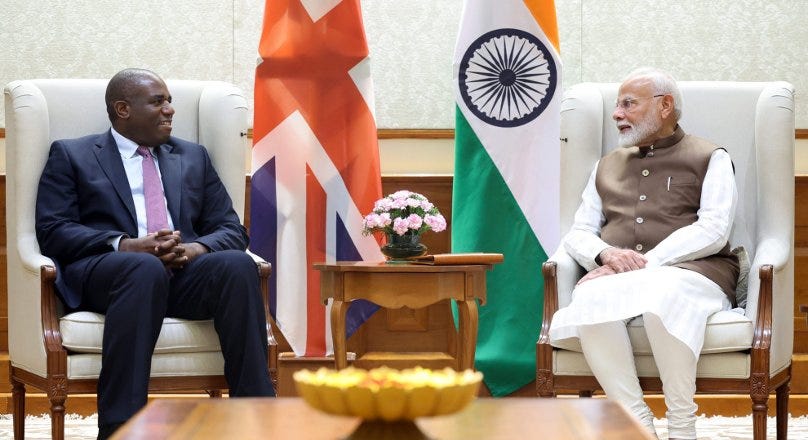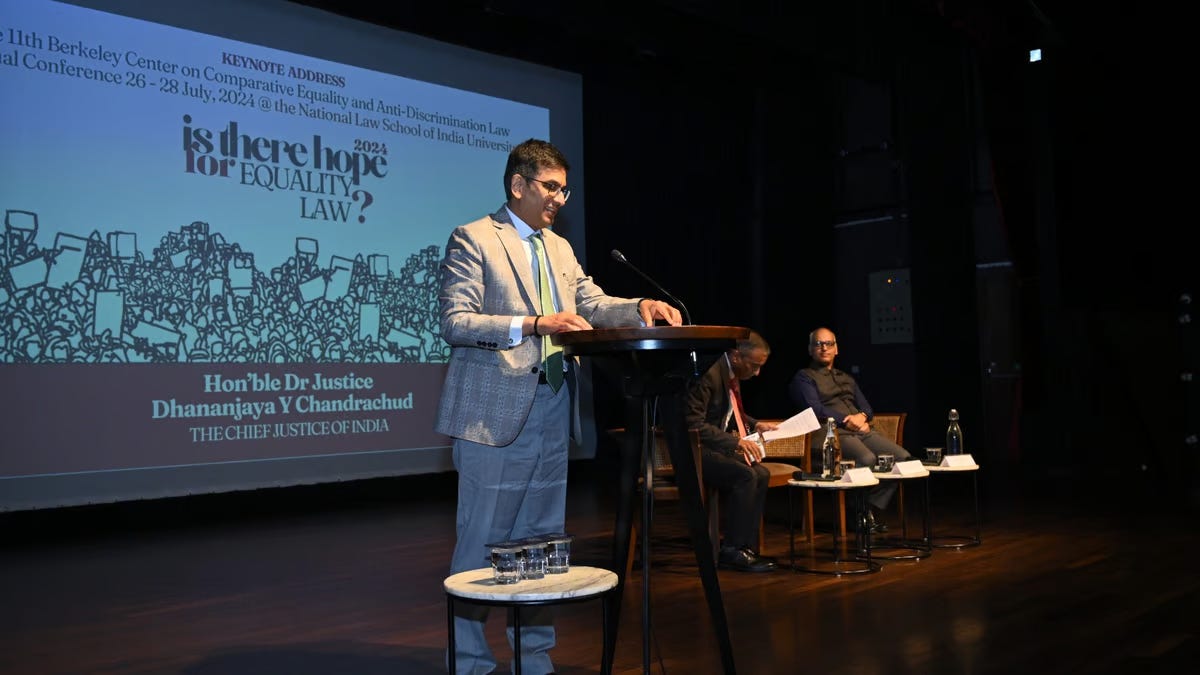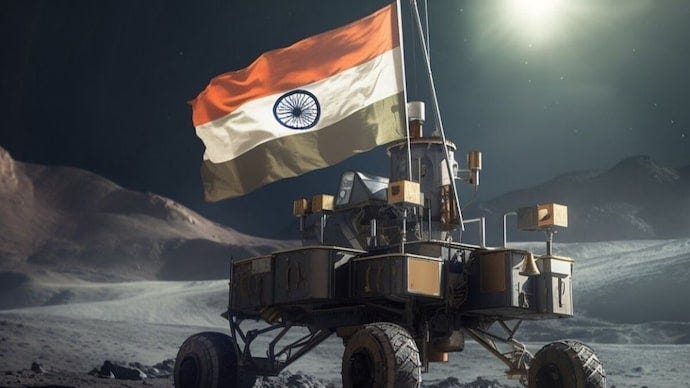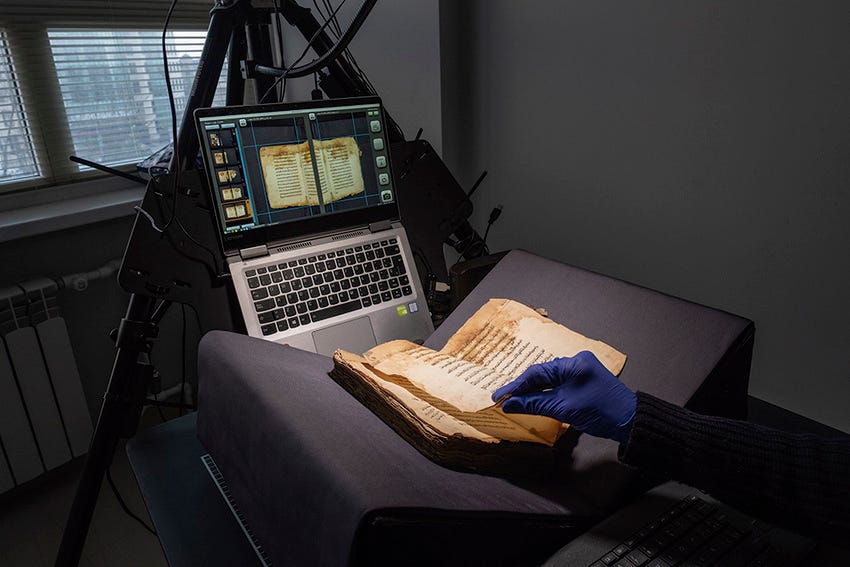India’s AI Expansion – Emerging Talent Hubs, Strategic Alliances, Digitization of Manuscripts and More
The AI4India Weekly #11
Welcome to the 11th Edition of The AI4India Weekly!
In this edition, we focus on the progress India is making across various AI initiatives and technological advancements. From the burgeoning AI talent hubs in Tier 2 and 3 cities to strategic collaborations like the UK-India Technology Security Initiative, we explore how these developments are shaping India's AI landscape. Discover the transformative potential of India's National Quantum Mission, the groundbreaking achievements in quantum technology at IISc, and emerging job opportunities in the AI sector. Additionally, we highlight the steps taken to digitize manuscripts in India and the prestigious Quad Fellowship, which aim to bolster India's global leadership in AI and STEM fields. Join us as we examine these exciting advancements and their implications for India's future in technology and innovation.
Tier 2 & 3 Cities: India's Emerging AI Talent Hubs
India's Tier 2 and 3 cities are rapidly emerging as prominent AI talent hubs, thanks to the proliferation of educational institutions and the growing presence of tech startups. Cities like Coimbatore, Indore, and Bhubaneswar are producing a wealth of skilled AI professionals, driven by improved access to quality education and training programs. These cities offer a more affordable living environment compared to metropolitan areas, making them attractive to both employers and employees.
Local governments and educational institutions in these regions are playing a pivotal role in fostering AI talent. Initiatives to incorporate AI and machine learning courses in the curriculum, along with industry partnerships, are equipping students with relevant skills. Startups in these cities are also thriving, benefiting from lower operational costs and the availability of a skilled workforce. This has led to a vibrant ecosystem where innovation and entrepreneurship are flourishing.
Companies are increasingly recognizing the potential of these cities, setting up offices and investing in local talent. The trend is contributing to balanced regional development and reducing the migration pressure on larger cities. As Tier 2 and 3 cities continue to grow as AI talent hubs, they are reshaping the landscape of technology and innovation in India, promoting inclusive growth and creating new opportunities across the country.
Strengthening Ties: India and UK Launch Technology Security Initiative
The UK-India Technology Security Initiative marks a significant step in enhancing technological collaboration and security between the two nations. This new framework is designed to bolster the existing collaborative efforts by addressing the evolving challenges in technology and security. The initiative aims to reinforce and expand dialogue channels between the UK and India, focusing on safeguarding critical technologies and addressing emerging risks. By leveraging both existing and new dialogues, the initiative seeks to fortify the resilience of technological infrastructure and ensure a secure technology landscape for both countries.
This strategic partnership emphasizes the importance of joint efforts in tackling global technological threats and promoting innovation. The initiative will facilitate deeper cooperation in areas such as cybersecurity, advanced technologies, and critical infrastructure protection. Through this strengthened collaboration, the UK and India aim to enhance their mutual capabilities and response mechanisms, ultimately contributing to a more secure and stable technological environment. This move highlights the growing importance of international partnerships in navigating the complex landscape of technology and security.
A Great Convergence: Driving India’s AI Revolution
India is strategically positioned to lead the global AI revolution by leveraging a combination of robust public policy and vibrant private sector innovation. The country’s dual approach focuses on developing localized AI solutions that address immediate societal needs while investing in foundational AI models for long-term sustainability and global competitiveness. This strategy involves substantial domestic investment, supported by policy frameworks, strategic manufacturing initiatives, and innovation centers.
Central to this vision is India’s AI mission, which includes enhancing computational capacity, fostering innovation, developing open datasets, and upskilling the workforce. The mission aligns with the country’s broader Digital Public Infrastructure (DPI) strategy, supported by public sector funding and private sector expertise. Complementing this is the Data Empowerment and Protection Architecture (DEPA), which streamlines data consent management, and the Production-Linked Incentive (PLI) schemes that bolster AI hardware manufacturing within India.
The PLI schemes have already driven significant growth in electronics manufacturing, contributing to a projected expansion of the AI market from $881 million in 2023 to $7.8 billion by 2025. Emerging AI enterprises, such as Sarvam and Krutrim, are advancing foundational models and AI applications across various sectors, including healthcare, retail, and automotive. This dynamic environment, fueled by effective policies and substantial investments, positions India to become a global AI leader, creating a self-reinforcing cycle of innovation, capital augmentation, and economic growth.
AI in Policing: A Double-Edged Sword
Chief Justice of India, DY Chandrachud, recently raised concerns about the use of AI in policing, cautioning that it might lead to the targeting of marginalized communities. Speaking at a legal event, he highlighted that while AI can enhance efficiency, it also risks perpetuating biases present in historical data. Justice Chandrachud emphasized the need for ethical guidelines and oversight to prevent discriminatory practices, ensuring that AI serves justice equitably without reinforcing societal inequalities.
"India's rich demographic patterns, characterized by linguistic diversity, regional variations, and cultural nuances, present a unique set of challenges and opportunities for AI deployment. As responsible users, we must ask ourselves these critical questions to ensure that our engagement with AI is ethical and equitable. We need to be vigilant about the origins of data and its potential biases, scrutinize the algorithms we employ for transparency and fairness, and actively seek to mitigate any unintended discriminatory effects," said the CJI who has been at forefront of technological evolution of the judiciary in the country
IN-SPACe Invites Industry to Transform India’s Satellite Infrastructure Through PPP Model
The Indian National Space Promotion and Authorization Center (IN-SPACe) is spearheading a transformative initiative to revolutionize India’s satellite infrastructure by inviting private sector participation through a Public-Private Partnership (PPP) model. IN-SPACe aims to facilitate the development and management of satellite systems by leveraging the expertise and resources of industry players. This initiative is expected to accelerate satellite deployment, enhance operational efficiency, and drive innovation in space technology. By fostering collaboration between ISRO and private companies, IN-SPACe is paving the way for a more dynamic and competitive space sector in India.
Dr Pawan Goenka, Chairman, IN-SPACe said, "This is an initiative by IN-SPACe & ISRO towards creating a self-reliant, robust, and sustainable Earth Observation System catering to the growing demand for EO data. It is envisaged that the upstream infrastructure of the satellite constellation with advanced imaging technology will create significant downstream commercial potential, resulting in more competitive products"
National Mission for Manuscripts: Preserving India’s Rich Heritage
The National Mission for Manuscripts, under the Ministry of Culture, continues to make remarkable strides in documenting, conserving, digitizing, and disseminating India’s manuscript heritage. With over 100 Manuscripts Resource Centres and Manuscripts Conservation Centres across the nation, the Mission has achieved significant milestones.
To date, the Mission has documented approximately 5.2 million manuscripts and conserved 90 million folios. Through its extensive digitization efforts, 3.5 lakh manuscripts, encompassing 3.5 crore pages, have been digitized. The Mission has conducted over 100 conservation workshops and uploaded around 140,000 manuscripts to its web portal, with 75,000 available for free public access.
Since its inception, the Mission has published over 100 books, further enriching the accessibility and knowledge of India’s manuscript treasures. These efforts, as highlighted by Union Minister for Culture and Tourism, Shri Gajendra Singh Shekhawat, in a written reply in Rajya Sabha, underscore the Mission's dedication to preserving India’s invaluable manuscript heritage for future generations.
IISc Breakthrough: Detecting Single Photons at Room Temperature
In a groundbreaking development, researchers at the Indian Institute of Science (IISc) have achieved a significant milestone in the field of quantum technology by detecting single photons at room temperature. This innovation, spearheaded by the team at the Centre for Nano Science and Engineering (CeNSE), addresses a long-standing challenge in quantum computing and communication, where detecting single photons typically requires extremely low temperatures and sophisticated equipment.
The IISc researchers have developed a novel method using a two-dimensional material, hexagonal boron nitride (hBN), which can operate effectively at room temperature. This advancement not only simplifies the detection process but also paves the way for more practical and scalable quantum technologies. The ability to detect single photons with such ease holds immense potential for applications in secure communication, quantum cryptography, and advanced imaging technologies.
This breakthrough will significantly impact the field of AI in India with the enhanced capabilities in quantum computing and communication having the potential of leading to more powerful AI algorithms and faster processing speeds, enabling more complex and accurate models. Additionally, the integration of quantum technologies with AI can drive innovations in various sectors, including healthcare, finance, and cybersecurity, by providing superior data processing and analysis capabilities. As India continues to advance in AI research and development, the IISc's achievement in single-photon detection will play a crucial role in propelling the country to the forefront of the global AI landscape.
Exploring Emerging Jobs in AI: Trends and Opportunities
As the AI landscape continues to evolve, new job roles and opportunities are emerging, reflecting the rapid advancements in technology and the growing demand for specialized skills. Here are some notable highlights which illustrate these trends:
National Quantum Mission: Pioneering India’s Quantum Future
The National Quantum Mission (NQM) is set to propel India to the forefront of quantum technology by focusing on quantum computing, communication, and sensing. Its goals include developing scalable quantum computers, establishing secure quantum communication channels, and enhancing precision measurement technologies. The mission aims to foster collaboration between academia, research institutions, and industry to build a robust quantum ecosystem.
As the NQM unfolds, it is creating a variety of job opportunities across the quantum technology sector. Key roles include Quantum Software Developers, Quantum Hardware Engineers, Quantum Communication Specialists, and Quantum Researchers. To know more, click here
Quad Fellowship: Empowering Future Leaders in STEM
The Quad Fellowship is an esteemed program designed to support and nurture the next generation of STEM leaders from the Quad countries—Australia, India, Japan, and the United States. This prestigious fellowship offers up to $50,000 in funding for graduate studies in science, technology, engineering, and mathematics (STEM) fields at leading universities in the U.S. The program aims to foster international collaboration and innovation by providing fellows with financial support, professional development opportunities, and access to a global network of peers and experts. Through this fellowship, recipients will gain valuable experience and skills to drive advancements in their fields and contribute to global technological progress. With the 2024 Quad Fellowship batch finalized, check out the website for more information and how to apply.
NOTE : The views expressed by the authors are their own. AI4India as a forum does not endorse any comments on specific brands, products, platforms or companies.
Join our AI4India.org forum to be a part of the AI revolution in India by visiting our site now.
Follow us on our X and LinkedIn to receive interesting updates and analysis of AI-related news












